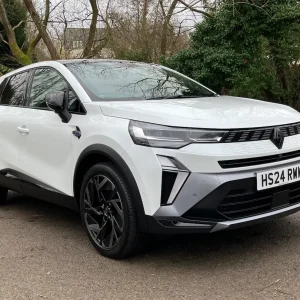Smart as a brand is celebrating its 25th birthday this year but gone are the days when the nameplate equalled tiny, but clever city cars, sadly. Instead, following its reimagining as an all-electric brand in 2017, Smart owner Mercedes-Benz announced a 50-50 joint venture with the Chinese Geely company. The first result of this collaboration is the #1, which is built in China using Geely technology (with plenty of European input) – and it’s finally available in the UK.
Built on Geely’s SEA architecture, the #1 is far more conventionally styled, with many cues shared with the latest Mercedes SUV range. The most interesting parts of this Smart’s design are the front and rear light bars, plus the distinctive front and rear air dams and the ‘Smart’ badging. Perhaps most unique from the side, this Smart has an upward curve to the chunky underbody cladding. Plus, flush door handles, unusual alloy wheel designs and a chrome Smart logo halfway up the rear roof pillar on the curvy window line.
The Mercedes design influence is equally obvious on the inside of the #1, with the stowage-laden tall centre console, and the metal detailing on the multifunction three-spoke steering wheel and switchgear. Smart’s quirkiness is only obvious in the gloss trim on the dashboard, centre console and door pulls. There are also two Smart logos on the steering wheel. Still, like the early LHD cars we drove before, quality appears to have stepped up a few notches.
After driving the mid-range Premium, we spent more time with the range-topping Brabus at the UK launch. Unlike previous tie-ups with the German tuner, this one seems disappointingly restrained on the outside and inside. Outside, the ‘Brabus’ badging is limited to just two, which are hidden in the chunkier front and rear air dams. Other exterior changes revolve around another set of 19in wheels that look quite small in the arches and bonnet vents.
Inside, Brabus additions include Alcantara trim for the steering wheel and seats, red seat belts and metal pedals. A key part of the #1’s interior is the large 12.8in touchscreen, with its big, cartoonish fox graphic on the bottom right. Previously, with the fox moving around, it all seemed a bit busy when we drove this Smart. This time it bothered us less; then again, we were in guest mode. Like before, once we’d worked out where the key functions were, it was surprisingly intuitive. We are also appreciated the permanent climate controls at the bottom of the screen, and the set of physical buttons below them.
Elsewhere, the driving position is comfortable and multi-adjustable, although we wonder if the seats should be more supportive considering the level of performance available. Space in the back is just as generous, but the boot at 313 litres is just average.
On the road, considering the fact that the Brabus boasts an almost unbelievable 422hp, the #1 impresses around town with how docile it is. However, at speed it’s a different story, with revised front suspension to deal with its extra motor, it’s something of a handful. That’s because despite the extra power, the Brabus shares the same size wheels, refined suspension settings and brakes as the 268hp Pro+ and Premium models. This is fine with those models, but feels like badge-engineering for the Brabus. Don’t get us wrong, the #1 Brabus’s acceleration will make you smile, but apart the power, it’s tidy rather than an involving drive – and we’d still go for the standard car. Our mostly urban driving route made it impossible to judge this Smart’s 248 mile range, but if you use the considerable performance, it quickly eats into that. Good thing then that all versions accept up to 150kW from a CCS charger, giving a sub-30-minute 10 to 80% charging time. Still, the #1 remains the most convincing model to date, just stick to the Pro+ and Premium versions.
Smart #1 Brabus
P11D: £43,395
Residual value: 44.7%
Depreciation: £23,963
Fuel: £4,500
Service, maintenance and repair: £2,540
Cost per mile: 51.67p
Range: 248 miles
CO2 (BIK %): 0g/km (2%)
BIK 20/40% a month: £14/£28
Luggage capacity: 313 litres
Battery size/power: 66kWh/422hp





